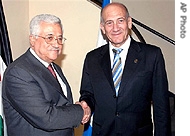VOA标准英语2008年-Mideast Summit Overshadowed by Settlements, Cor(在线收听)
By Robert Berger
Jerusalem
02 June 2008
Israeli and Palestinian leaders have held a summit meeting in a bid to advance the peace process. But new obstacles have emerged, as we hear from Robert Berger at the VOA bureau in Jerusalem.
 |
| Mahmoud Abbas (l) and Ehud Olmert in Jerusalem, 02 Jun 2008 |
Israeli Prime Minister Ehud Olmert hosted Palestinian President Mahmoud Abbas at his official residence in Jerusalem. They discussed the status of negotiations, as the United States pushes for a peace agreement by the end of the year.
But that goal has been put further in doubt by Israeli settlement expansion and a corruption scandal embroiling Mr. Olmert. He is facing growing demands to resign after an American Jewish businessman testified that he gave him envelopes stuffed with cash to support a lavish lifestyle. Those calling for Mr. Olmert to step down include his foreign and defense ministers.
In addition, Mr. Olmert infuriated the Palestinians by approving plans for nearly 900 new housing units for Israelis in disputed East Jerusalem, on land the Palestinians claim for a future state.
Before the meeting, President Abbas issued an angry protest.
"If Israel does not stop these settlement activities, it will be difficult to reach a peace agreement," he said.
The Palestinians and the U.S. say the "roadmap" peace plan, on which negotiations are based, requires a freeze in construction in the settlements. But Israeli spokesman Mark Regev says that does not apply to Jerusalem, which is the eternal capital of the State of Israel.
"In the Jewish neighborhoods of Jerusalem, there's not going to be a freeze, there can't be a freeze," he said. "We never promised to freeze construction in those areas."
Prime Minister Olmert reassured President Abbas that the corruption scandal would not affect negotiations and that Israel remains committed to the goal of a peace agreement by the end of the year. After the summit meeting, Mr. Olmert headed to Washington for talks with President Bush.